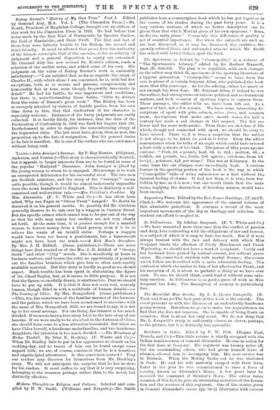Tar-EL—John Armiger's Revenge. By P. Hay Hunter. (Oliphant, Anderson, and
Ferrier.)—This story is characteristically Scottish, but it appeals to larger interests than are to be found in some of the popular " Kailyard" literature. John Armiger is jilted by the young woman to whom he is engaged. His revenge is to work an unexpected deliverance for his successful rival The two men are Scottish ministers, and the story of the "revenge" seems quite possible, though it would be almost ludicrously impossible were the scene transferred to England. This is distinctly a well conceived and well-written tale.—Mrs. Crichton's Creditor. By Mrs. Alexander. (F. V. White and Co )—It has often been asked, Why was Fagin in "Oliver Twist" hanged ? No doubt he deserved it on his general merits. So possibly did Mr. Crichton generally deserve to be run over by a waggon in Cannon Street. But the specific crimes which caused him to be put out of the way so that his wife may marry her creditor are not very clearly set forth. At the same time, it is pessimi exempli for a married woman to borrow money from a third person, even if it be to relieve the wants of an invalid sister. Perhaps a waggon would have been too heavy a punishment, but a hansom-cab might not have been too much.—A Rich Man's Daughter. By Mrs. J. H. Riddell. (Same publishers.)—There are some things here that remind us of the Mrs. J. H. Riddell of "George Geith " and other " City " novels. She is manifestly at home in business matters, and leaves the critic no opportunity of pointing out the familiar blunders which give him so often such readily available material. But this story is hardly as good as we should expect. Much trouble has been spent in elaborating the figure of Dr. Claud Dagley, but, as it seems, to little purpose. It is not that the figure, so carefully drawn, is unattractive. That we should have to put up with. It is that it does not seem real, scarcely human, though filled in with a multitude of human details.— The Coming of Chloe. By Mrs. Hungerford. (Same publishers.) —This, too, has some traces of the familiar manner of the humour and the pathos, which we have been accustomed to associate with the name of Mrs. Hungerford. Still, we are bound to say, it is not up to her usual average. For one thing, the interest is too much divided. If we are to have a love-story let it be the love-story of our heroine. If we were really to be absorbed in the fortunes of Chloe, she should have come to a less attractive household. But when we have Chloe herself, a handsome materfamilias, and two handsome daughters, the attention is too much divided.—The Blindness of Madge Tindall. By Silas K. Hocking. (F. Warne and Co.)— When Dr. Studley fails to put in his appearance at church on his wedding-day, and no traces of him can be found except some unpaid bills, we are, of course, convinced that he is a heartless and unprincipled adventurer. Is this conviction correct ? That our readers may discover for themselves from Mr. Hocking's story. We will not anticipate the surprise that he has in store for his readers. It must suffice to say that it is very surprising, belonging to the romance perhaps rather than to the novel, but distinctly effective.






















































 Previous page
Previous page